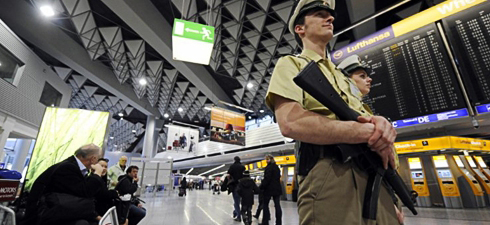Security or freedom? This age-old dilemma still gnaws at us – and with added urgency whenever terrorism and crime become more aggressive. After 9/11 the security imperative gained ascendancy, to the point of eclipsing virtually every other concern. And this state of mind has now returned with a vengeance in what are not entirely calmly considered reactions to the failed bombing of a plane bound for the United States.
Should we then resign ourselves to an ongoing erosion of basic rights, to a gradual waning of democratic principles? Even in these hard times, politicians need to keep a level head, restrain their emotions and resist the temptation of believing the reaction to terrorism must necessarily entail curbs on civil liberties. So let’s try to jog our collective memory a little: The day after the 11 March 2004 train bombings in Madrid, King Juan Carlos underscored the need for firm adherence to the principles of the rule of law; and after the 7 July 2005 Tube bombings in London, Queen Elizabeth declared that the terrorists “will not change our way of life”, thereby drawing a boundary line which a democratic system cannot cross if it is to remain more than a democracy-in-name-only.
Today we are wholly preoccupied with full-body scanners, invasive machines which, originally designed for medical purposes, allow security personnel to “read” people’s bodies, revealing every detail, including any objects they might have on their person. This is not the first time policymakers have succumbed to the lure of the technological panacea, which distorts reality and suggests solutions that could well prove dangerous and ineffective.
Failure of intelligence services
The distortion is manifest in that the current debate is almost entirely polarized around the technological apparatus itself, which quite obscures the more unsettling aspect of the incident: viz. the failure of US intelligence more than that of Amsterdam airport’s security checks. The fact is the US authorities had information about the suicide bomber, they knew he had booked that flight, and yet they were unable to put two and two together and stop him from boarding. So the intelligence services are mainly to blame, not the technology. An administrative failure, not a technological one. Policymakers are delegating a dangerous amount of responsibility to technology in a bid to dodge difficult questions. Among other things, the colossal cost of installing full-body scanners at every airport now points up the primary need to improve the coordination of counterterrorism efforts. After all, even allowing that these machines do succeed in assuring flight security, the terrorists are not going to simply pack up their schemes and give up. In this context, the question of full-body scanners should be viewed according to three criteria: effectiveness, sustainability, and respect for human dignity and freedom. The financial investment it entails is tremendous, particularly in view of the sheer number of scanners that would have to be used if security checks are not to take unbearably long.
And what about the “virtual striptease” to which passengers are to be subjected? For months this very issue has preoccupied the European Commission. After consulting the EU Agency for Fundamental Rights as well as member states’ privacy watchdogs, it has received highly critical responses calling for a number of guarantees: that these instruments be used solely with due respect for the principles of necessity and commensurability and according to specific legal stipulations; the option to refuse to submit to a full-body scan and opt for a manual search instead; the adoption of technology to obscure the subject’s sexual characteristics and any physical defects and only identify objects on the subject’s person; separating personnel who actually see the subject face to face from those who carry out the scan; and the subsequent destruction of the images produced by the scan. But there is more to all this than mere technological issues: the European Union has to determine whether such measures are compatible with its Charter of Fundamental Rights, whose very preamble affirms the inviolability of human dignity. This is not a merely rhetorical appeal. The gradual erosion of human rights and freedom, and the mithridisation [i.e. de-sensitisation] of society towards encroachments on human dignity, are unacceptable.
OPINION
Pantsman’s victory over the West
“Overnight, Umar Farouk Abdulmutallab has turned from a complete loser – a friendless student who blogged about masturbation and supported Liverpool – into a threat to civilisation.” So writes Spiked editor Brendan O’Neill on “Pantsman” - the pampered University College London student who failed to detonate a bomb concealed inside his trousers on the Christmas day flight from Amsterdam to Detroit.
To the action of one lone jihad fantasist, “both London and Washington have responded to his actions rashly and ridiculously, by further securitising society, eroding liberty, clamping down in airports.” Such privacy-obliterating measures demonstrate what makes terrorism a powerful force. “It is not the belief systems of the alleged terrorists themselves (which are weird and wacky) or the power of the terrorists to inflict harm on individuals (which is real, but extremely limited); rather it is the fragility of contemporary society, the often-advertised vulnerability and deep feeling of insecurity of communities across the West, which gives terrorism its purchase and momentum.” In conclusion, he writes - “Looking through everyone’s clothes in airports is no substitute for a discrete, intelligence-based policing of properly dangerous individuals.”
Do you like our work?
Help multilingual European journalism to thrive, without ads or paywalls. Your one-off or regular support will keep our newsroom independent. Thank you!
















